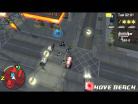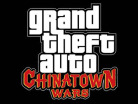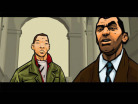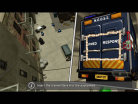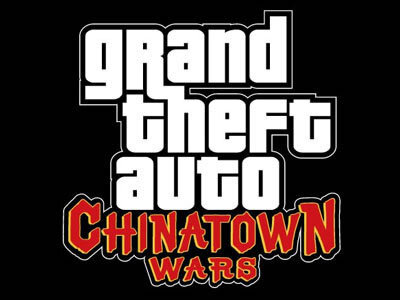- CLASSIC MAGAZINES
- REVIEW CREW
A show recapping what critics thought back
when classic games first came out! - NEXT GENERATION'S BEST & WORST
From the worst 1-star reviews to the best
5-stars can offer, this is Next Generation! - NINTENDO POWER (ARCHIVE)
Experience a variety of shows looking at the
often baffling history of Nintendo Power! - MAGAZINE RETROSPECTIVE
We're looking at the absolutely true history of
some of the most iconic game magazines ever! - SUPER PLAY'S TOP 600
The longest and most ambitious Super NES
countdown on the internet! - THEY SAID WHAT?
Debunking predictions and gossip found
in classic video game magazines! - NEXT GENERATION UNCOVERED
Cyril is back in this spin-off series, featuring the
cover critic review the art of Next Generation! - HARDCORE GAMER MAGAZING (PDF ISSUES)
Download all 36 issues of Hardcore Gamer
Magazine and relive the fun in PDF form!
- REVIEW CREW
- ELECTRONIC GAMING MONTHLY
- ELECTRONIC GAMING MONTHLY RANKS
From Mario to Sonic to Street Fighter, EGM
ranks classic game franchises and consoles! - ELECTRONIC GAMING MONTHLY BEST & WORST
Counting down EGM’s best and worst reviews
going year by year, from 1989 – 2009! - ELECTRONIC GAMING BEST & WORST AWARDS
11-part video series chronicling the ups and
downs of EGM’s Best & Worst Awards!
- ELECTRONIC GAMING MONTHLY RANKS
- GAME HISTORY
- GAME OVER: STORY BREAKDOWNS
Long-running series breaking down game
stories and analyzing their endings! - A BRIEF HISTORY OF GAMING w/ [NAME HERE]
Real history presented in a fun and pithy
format from a variety of game historians! - THE BLACK SHEEP
A series looking back at the black sheep
entries in popular game franchises! - INSTANT EXPERT
Everything you could possibly want to know
about a wide variety of gaming topics! - FREEZE FRAME
When something familiar happens in the games
industry, we're there to take a picture! - I'VE GOT YOUR NUMBER
Learn real video game history through a series
of number-themed episodes, starting at zero! - GREAT MOMENTS IN BAD ACTING
A joyous celebration of some of gaming's
absolute worst voice acting!
- GAME OVER: STORY BREAKDOWNS
- POPULAR SHOWS
- DG NEWS w/ LORNE RISELEY
Newsman Lorne Riseley hosts a regular
series looking at the hottest gaming news! - REVIEW REWIND
Cyril replays a game he reviewed 10+ years
ago to see if he got it right or wrong! - ON-RUNNING FEUDS
Defunct Games' longest-running show, with
editorials, observations and other fun oddities! - DEFUNCT GAMES QUIZ (ARCHIVE)
From online quizzes to game shows, we're
putting your video game knowledge to the test!- QUIZ: ONLINE PASS
Take a weekly quiz to see how well you know
the news and current gaming events! - QUIZ: KNOW THE GAME
One-on-one quiz show where contestants
find out if they actually know classic games! - QUIZ: THE LEADERBOARD
Can you guess the game based on the classic
review? Find out with The Leaderboard!
- QUIZ: ONLINE PASS
- DEFUNCT GAMES VS.
Cyril and the Defunct Games staff isn't afraid
to choose their favorite games and more! - CYRIL READS WORLDS OF POWER
Defunct Games recreates classic game
novelizations through the audio book format!
- DG NEWS w/ LORNE RISELEY
- COMEDY
- GAME EXPECTANCY
How long will your favorite hero live? We crunch
the numbers in this series about dying! - VIDEO GAME ADVICE
Famous game characters answer real personal
advice questions with a humorous slant! - FAKE GAMES: GUERILLA SCRAPBOOK
A long-running series about fake games and
the people who love them (covers included)! - WORST GAME EVER
A contest that attempts to create the worst
video game ever made, complete with covers! - LEVEL 1 STORIES
Literature based on the first stages of some
of your favorite classic video games! - THE COVER CRITIC
One of Defunct Games' earliest shows, Cover
Critic digs up some of the worst box art ever! - COMMERCIAL BREAK
Take a trip through some of the best and
worst video game advertisements of all time! - COMIC BOOK MODS
You've never seen comics like this before.
A curious mix of rewritten video game comics!
- GAME EXPECTANCY
- SERIES ARCHIVE
- NINTENDO SWITCH ONLINE ARCHIVE
A regularly-updated list of every Nintendo
Switch Online release, plus links to review! - PLAYSTATION PLUS CLASSIC ARCHIVE
A comprehensive list of every PlayStation
Plus classic release, including links! - RETRO-BIT PUBLISHING ARCHIVE
A regularly-updated list of every Retro-Bit
game released! - REVIEW MARATHONS w/ ADAM WALLACE
Join critic Adam Wallace as he takes us on a
classic review marathon with different themes!- DEFUNCT GAMES GOLF CLUB
Adam Wallace takes to the links to slice his way
through 72 classic golf game reviews! - 007 IN PIXELS
Adam Wallace takes on the world's greatest spy
as he reviews 15 weeks of James Bond games! - A SALUTE TO VAMPIRES
Adam Wallace is sinking his teeth into a series
covering Castlevania, BloodRayne and more! - CAPCOM'S CURSE
Adam Wallace is celebrating 13 days of Halloween
with a line-up of Capcom's scariest games! - THE FALL OF SUPERMAN
Adam Wallace is a man of steel for playing
some of the absolute worst Superman games! - THE 31 GAMES OF HALLOWEEN
Adam Wallace spends every day of October afraid
as he reviews some of the scariest games ever! - 12 WEEKS OF STAR TREK
Adam Wallace boldly goes where no critic has
gone before in this Star Trek marathon!
- DEFUNCT GAMES GOLF CLUB
- DAYS OF CHRISTMAS (ARCHIVE)
Annual holiday series with themed-episodes
that date all the way back to 2001!- 2015: 30 Ridiculous Retro Rumors
- 2014: 29 Magazines of Christmas
- 2013: 29 Questionable Power-Ups of Christmas
- 2012: 34 Theme Songs of Christmas
- 2011: 32 Game Endings of Christmas
- 2010: 31 Bonus Levels of Christmas
- 2009: 30 Genres of Christmas
- 2008: 29 Controls of Christmas
- 2007: 34 Cliches of Christmas
- 2006: 33 Consoles of Christmas
- 2005: 32 Articles of Christmas
- 2004: 31 Websites of Christmas
- 2003: 29 Issues of Christmas
- 2002: 28 Years of Christmas
- 2001: 33 Days of Christmas
- NINTENDO SWITCH ONLINE ARCHIVE
- REVIEW ARCHIVE
- FULL ARCHIVE
Grand Theft Auto: Chinatown Wars
Half a year ago I played through Rockstar Games' very first Nintendo DS title, the ultraviolent Grand Theft Auto: Chinatown Wars. At the time I was floored by how well Nintendo's handheld could reproduce the sandbox experience. I ended up giving it a high score, complementing its pacing and even compared it to the Real Ghostbusters cartoon. But since then I've been troubled with my review. It's not that I dislike the game, but the more I dwelled on the minor problems the more they bothered me. For months I've wished that I could go back and rewrite my Chinatown Wars review, explaining in greater detail what works and doesn't about this handheld action game. Now, thanks to the recently released PSP port, I have that chance to expand on my original thoughts.
Grand Theft Auto: Chinatown Wars on the PSP is exactly what you think it is, it's a direct port of the Nintendo DS on Sony's four year old handheld. There have been some changes made, including better graphics, better radio stations and the removal of any touch screen action. Despite these changes, the game remains the same, featuring the same story, cinemas, world and bonus content.
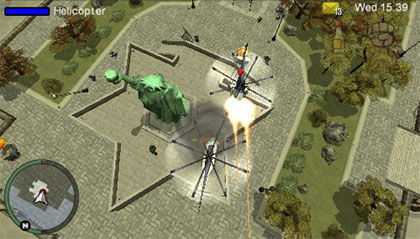
In Chinatown Wars you play Huang Lee, a 25 year old Liberty City native returning from Hong Kong with his family's heirloom sword. As the story opens we learn that Huang's father, a Triad boss, has been killed and it's your duty to avenge his death. It doesn't take long to get the story rolling, especially when your welcoming committee is made up of a bunch of murdering scum who ambush you, shoot you in the face and then leave you for dead in a car sinking into the Liberty City waterway. Thankfully you are able to escape from what looks like certain death, but not before the ancient sword is stolen and passed to every crime boss with a foreign sounding name.
Before long the game places you in a traditional Grand Theft Auto world with familiar missions, characters and themes. You start out gaining respect and running errands for your uncle, then move up to dealing drugs for money and eventually get involved with crooked police officers, crime bosses and other untrustworthy Liberty City natives. All the while you will be on your mission to figure out what happened to your family's sword, avenge your father's murder and get away from all of the inside politics that happen in the wake of the untimely death.
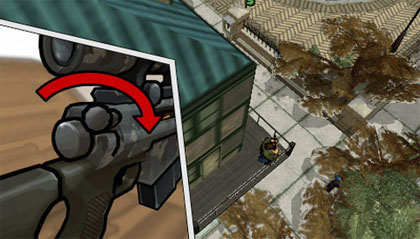
It will take almost 60 missions before you finally get some resolution to your quest. Along the way you'll run into a lot of colorful characters and get yourself involved in the kinds of outlandish situations that we've come to expect from the Grand Theft Auto series. Veterans of the series will no doubt recognize many of the missions, which often have you protecting somebody, taking out large groups of bad guys or just driving people around like an overpriced chauffeur. However, as you get further into the game you'll discover that there's much more for you to do, including everything from pretending to be a Chinese dragon performing tricks during a parade to working in a tattoo parlor. The game does a good job of giving you missions you haven't seen in other Grand Theft Auto games; something that definitely helps set this game apart from those recent console titles.
All of the game's missions feel like they were designed with the idea of a portable game system in mind. Very few of the missions run for more than a few minutes, most resembling their tactic when making Liberty City Stories for the PSP. That's not to say that the missions aren't as interesting as their console counterparts, but you rarely have to deal with missions having more than two or three different parts. The game's short missions help keep things moving along at a quick pace, which in turn allows the developers to add more variety to the mission types.
If you played the Nintendo DS version of the game then you no doubt know how important the touch screen mini-games are to the overall story. Going into this PSP port I worried that the developers may have excised all of these mini-games. Thankfully I was wrong. Instead of touching the screen to hotwire cars and plant plastic explosives, you use the PSP's two trigger buttons and the analog nub.
This set-up works surprisingly well. When I played the game on the Nintendo DS I was struck by how intrusive the constant touch screen events were. Don't get me wrong, I loved the idea of having more interaction with the city, but the switching between the stylus and the D-pad drove me up the wall. This time around I had a better time with these mini-games, thanks in large part to the fact that I didn't have to change the way I was holding the game system. Even if you lose some of the gimmick of actually doing the actions, I'm not sure I would ever go back to the touch screen style of gameplay.
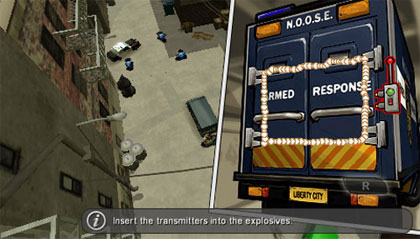
Even though I preferred the PSP approach to the mini-games, I worried that for some crucial missions this set-up wouldn't evoke the same stressful feelings the developers were going for in the original. I'm glad to report that I was wrong about that, too. In my review of the original Nintendo DS version I spoke of a mission where you had to race away from the Liberty City
International Airport in an ambulance. You were being chased by cops and tasked with keeping a very sick man alive. The problem is that you constantly had to resuscitate this guy so that he didn't die, requiring you to take your hands off the steering wheel and peddles long enough to tap him back to life. As you can imagine, this was stressful. I was surprised when I found out that the PSP version of this (which featuring you using the shoulder buttons) is just as stressful, even if you don't have to move your hands. It turns out that it's extremely hard to drive and tap the shoulder buttons at the same time. Who knew?
Moving beyond the redone mini-games, I was happy to see that the graphics were improved over the Nintendo DS version. While the DS version was certainly a good looking game, the small graphics and jaggy edges were sometimes hard on the eyes. This PSP version, on the other hand, cleans all of the roughness up. The game still looks like a Saturday morning cartoon version of the Grand Theft Auto franchise, but it looks about as good as it possibly can on a handheld game system. The comic book-style cinemas pop off of the PSP's widescreen display and you'll see detail you never knew was there.
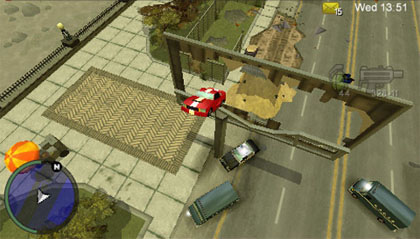
At the same time the game looks considerably different from that of Liberty City Stories and Vice City Stories. Instead of trying to ape Grand Theft Auto III, Chinatown Wars feels like a beefed up version of first two Grand Theft Auto games. While not told from a completely overhead point of view, the game certainly has a more bird's eye view of the action. The graphics are simple; it definitely has a different vibe from most of the other games in the series. But I like that. In some ways I actually prefer the way this game looks over the older PSP outings. Given the system's lack of a second analog stick and missing buttons, this Grand Theft Auto felt a lot more manageable on the PSP. Still, recent fans of the series may find jumping into Chinatown Wars to be a jarring experience.
What I was struck by while playing through Chinatown Wars a second time is how much fun most of the missions are. After putting so much time into so many different Grand Theft Auto games it's easy to become complacent with the series. I'm so used to having to go kill this guy or go steal that car or rescue somebody from a bad guy. You always know what you're getting into with these types of games, so sometimes it feels like you're just going through the same motions in a different city. That's not the case with Chinatown Wars. Oh sure, there are a few missions that have you doing the cliche Grand Theft Auto stuff, but there's a surprising amount of diversity in this game. Plus, the missions are only a few minutes long, so you can play through a lot of different types of missions all within a short amount of time.
Unfortunately while running these missions I was reminded about one thing I could never overcome while playing the Nintendo DS original - the awkward driving controls. For a game all about exploring a huge city you would think there would be better vehicle handling. But for some odd reason this is not a skill I have mastered. Most of the cars go way too fast, making it hard to swerve around obstacles without taking a significant amount of damage. Usually this isn't a problem, but I found myself plowing into my fair share of cop cars, which meant that I had to battle them and take my wanted level down. And you can forget about the motorcycle, I might as well just walk out in the middle of traffic. My only recourse seemed to be taking the taxi cab everywhere.
Sadly my driving skills aren't the only thing lacking, I was disappointed to see that the audio presentation hasn't been improved much. Much like the Nintendo DS game, Chinatown Wars on the PSP only offers written text, there is no spoken dialogue. This is especially disappointed given the great voice work that went into the two previous PSP entries. Rockstar Games has proven that there's more than enough room on a UMD to do full voice acting.
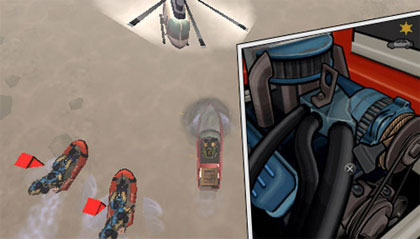
Thankfully the radio stations are a little better. While it's such an insignificant portion of the game, it was difficult to overlook the Nintendo DS's crummy radio stations. This time around Rockstar Games has licensed real music, though the stations still seem to be a bit limited in scope. I was happy to see that rockers Anvil had their own station, though this meant nothing to most of my friends.
What impresses me the most about this package is all of the new gameplay rules that have been implemented specifically for Chinatown Wars. A perfect example of this is the way the police chase after you. While having the cops tail you is nothing new to a Grand Theft Auto game, the way you deal with them this time around is both new and perfect for the smaller screen. Instead of just outrunning the police (which I quickly learned is hard to do from the top-down perspective), your job is to smash the police cars up so badly that they can't chase you anymore. To do this you need to get a few Burnout-style takedowns, enough literally "X" out a car and take your wanted level down. This is just one of the many ways that Chinatown Wars manages to set itself apart from the rest of the franchise, which in a weird way actually makes this game more endearing.
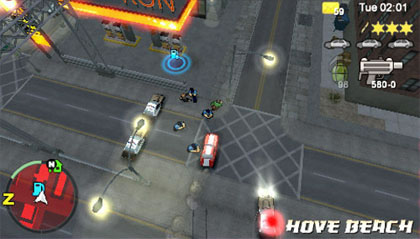
It wouldn't be a proper Grand Theft Auto game without a bunch of extra mini-games and missions to get lost in when you're bored of the story. Chinatown Wars has a great mix of new and old diversions, such as earning money through pretending to be a cab driver, police man, fire man, or any number of other professions in Liberty City. There's also a large emphasis on buying and selling drugs, which is the easiest way to earn money in this lawless city. And in a Grand Theft Auto first, you can actually go back and replay the story missions to see if you can earn a higher score. The rest is still pure GTA, so expect to collect hidden items, crash through billboards, drive a go-kart, race against other speed junkies and even get juiced up with the Rampage missions. Yup, this is a Grand Theft Auto game.
Grand Theft Auto: Chinatown Wars impresses yet again. While it's not perfect, I actually found myself having a better time playing through it the second time. If you have the choice between the Nintendo DS and the PSP, this PSP version is the way to go. I suspect that this will be the definitive version for some time to come. It may not be as technically impressive as Vice City Stories, but I wouldn't mind seeing this style of Grand Theft Auto continue on Sony's portable. Don't let the graphics fool you, Grand Theft Auto: Chinatown Wars has a lot to offer.
HOME |
CONTACT |
NOW HIRING |
WHAT IS DEFUNCT GAMES? |
NINTENDO SWITCH ONLINE |
RETRO-BIT PUBLISHING
Retro-Bit |
Switch Planet |
The Halcyon Show |
Same Name, Different Game |
Dragnix |
Press the Buttons
Game Zone Online | Hardcore Gamer | The Dreamcast Junkyard | Video Game Blogger
Dr Strife | Games For Lunch | Mondo Cool Cast | Boxed Pixels | Sega CD Universe | Gaming Trend
Game Zone Online | Hardcore Gamer | The Dreamcast Junkyard | Video Game Blogger
Dr Strife | Games For Lunch | Mondo Cool Cast | Boxed Pixels | Sega CD Universe | Gaming Trend
Copyright © 2001-2025 Defunct Games
All rights reserved. All trademarks are properties of their respective owners.
All rights reserved. All trademarks are properties of their respective owners.






